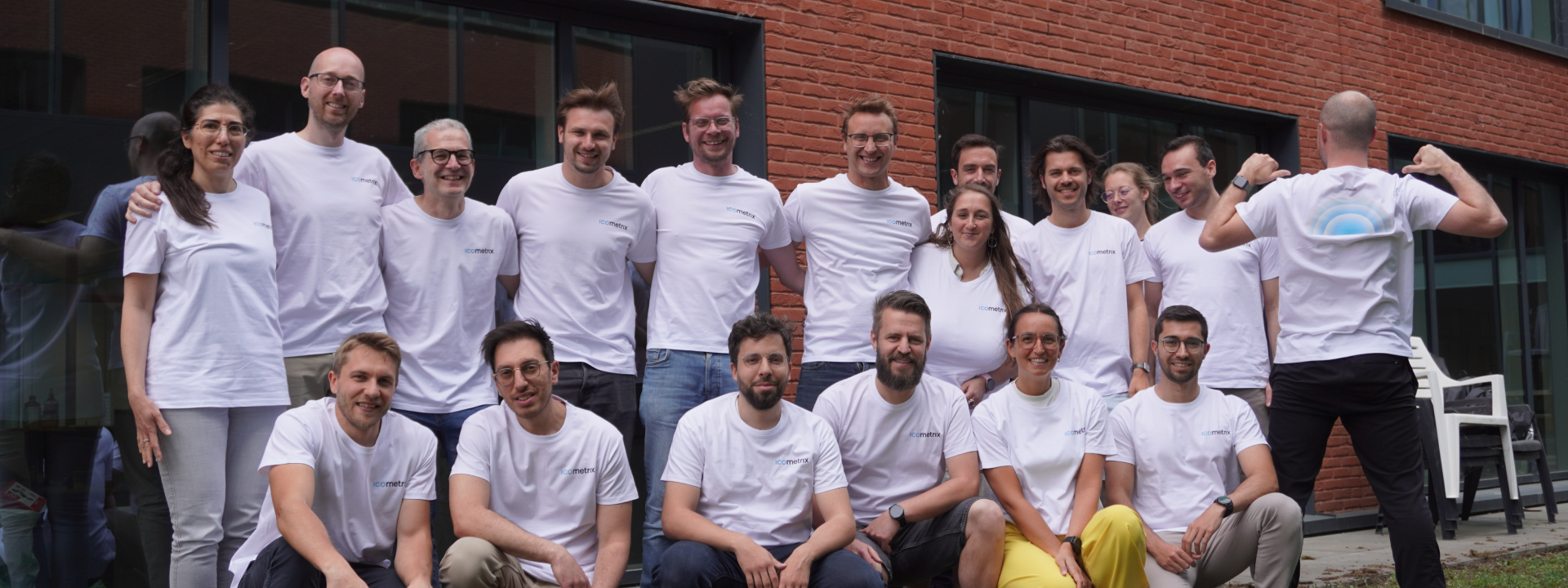
Seeing the invisible: How icometrix brings AI into neurological care
What if AI could help doctors see the invisible? That’s the vision behind icometrix, a healthcare AI company transforming how brain scans are used in clinical care. We spoke with CEO Wim Van Hecke about turning academic research into real-world solutions, the role of ethics in AI, and what it takes to truly innovate in healthcare.
Can you briefly introduce yourself and what icometrix does?
I’m Wim Van Hecke, CEO of icometrix. We develop AI software that helps physicians analyze brain scans more accurately, improving the diagnosis and monitoring of neurological conditions such as multiple sclerosis and Alzheimer’s disease. Our core technology, icobrain, translates complex MRI and CT data into clear, objective insights that support medical decision-making.
icometrix started as a university spin-off. Can you tell us more about its origins and your early motivations?
icometrix was founded in 2011 as a spin-off from the universities and university hospitals of Antwerp and Leuven. Together with my co-founder Dirk Loeckx, I saw how much valuable information brain scans contain—and how difficult it was for physicians to extract it efficiently. We realized that AI could bridge that gap between imaging data and clinical care and decided to bring that innovation out of the lab and into real-world practice.
What drew you to entrepreneurship, and what do you believe it takes to succeed in healthcare innovation?
I’ve always been passionate about the intersection of technology and healthcare and the impact it can have on patient care. Starting icometrix felt like the natural step to make a broader impact. As for what it takes: perseverance is key—especially in a field like healthcare, where innovation must align with strict regulatory requirements. Vision matters, but so does flexibility. You need to be bold, take risks, and stay committed, even when the journey is long. A good example is our push to obtain a CPT code in the U.S.—a complex, long-term, and risky process that paid off for both our company and the industry.
What’s your main piece of advice for startups in healthcare?
Don’t build technology for innovation’s sake—build it to improve lives. At icometrix, we focus not just on technical excellence, but on how our tools integrate into real-world care. If AI doesn’t fit seamlessly into existing workflows or improve outcomes, it won’t be adopted. That’s why we collaborate closely with hospitals, physicians, and pharma partners to make sure our solutions are both effective and usable.What makes your work personally meaningful and are there moments that have stayed with you?
What drives me most is hearing how icobrain helps doctors make more accurate diagnoses or better monitor treatment effects. When physicians or patients tell us we've helped change their lives, that’s incredibly powerful and reminds us why we do what we do.
What were some of the challenges in transitioning from academic research to a commercial company?
In research, the focus is often on innovation and scientific validation. While in business, you also need to think about scalability, regulatory approvals, and financial sustainability. Balancing scientific rigor with real-world demands was one of the biggest challenges, especially while keeping the patient at the center.
How does icometrix contribute to better healthcare in practice?
Our AI helps physicians diagnose neurological conditions more objectively and efficiently. For example, we recently launched icobrain aria, which assists doctors in monitoring side effects of new Alzheimer’s treatments. It’s a big step toward more personalized care.
AI already plays a major role in healthcare innovation. What’s your vision for the role of AI in medical imaging?
I believe the role of AI will continue to grow but should act as a supportive tool, not a replacement for physicians. It can speed up workflows, highlight patterns that are invisible to the human eye, and reduce variability. But ultimately, the doctor has to stay in control. That’s why we emphasize transparency and interpretability, so users can understand and trust the output.
Are there any risks you see with the growing use of AI in healthcare?
Yes, especially when AI systems operate as “black boxes”. In healthcare, trust is everything. Transparency and explainability—how an AI arrives at a certain conclusion—are essential to gaining that trust of both doctors and patients.
We also need to be vigilant about bias in AI models. It’s crucial that AI solutions are not only accurate, but also broadly applicable across diverse patient populations, regardless of age, gender, or ethnicity. This requires ongoing validation and collaboration with experts around the world to ensure that AI truly contributes to better and fairer healthcare.
How do you and your team stay up to date with new technologies?
We collaborate closely with academic institutions, follow the latest scientific publications, and actively participate in AI and medical conferences. We also have a dedicated R&D team that integrates new techniques into our software.
What role does technology play at icometrix, and what tools or innovations are essential to your team?
Technology is at the heart of our company. Without AI and deep learning, icobrain wouldn’t exist. It’s not just about the technical innovation—ease of use and integration into hospital systems are equally important.
As for tools, we rely on platforms like Google and AWS for cloud computing and communication. But more importantly, we depend on our incredible team, who bring passion and purpose every single day.
How do you balance innovation with ethics, especially when working with sensitive medical data?
That’s a top priority for us. Our AI models comply with strict regulations like GDPR and HIPAA, and we always put patient privacy and safety first. Data anonymization and patient safety always come first, and we work closely with ethics boards to ensure our innovations are used responsibly.